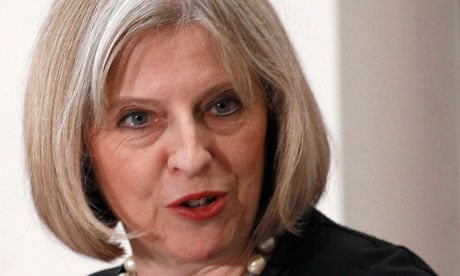The home secretary, Theresa May, is to end the right to permanent settlement for more than 100,000 skilled workers and overseas students who come to Britain each year.
In her first major speech on migration, the home secretary also disclosed that she intends to drastically reduce the flow of 160,000 overseas students who come to the UK to study on below degree-level courses in further and higher education colleges.
Those on below degree-level courses are nearly half the 320,000 students who come to study in Britain each year.
May was anxious to reassure Britain's prestigious universities that students coming to study on degree-level courses and above would not be affected by the new curbs.
"I want a system where we continue to attract the top students coming to our top universities," she said, adding that students studying at privately funded colleges were much more likely to overstay than those at universities.
May's speech also sought to row back on David Cameron's announcement – made during prime minister's questions on Wednesday – that 30,000 skilled migrants working for multinational companies would be excluded from the proposed immigration cap next year.
She indicated that while they would not be included in the annual cap, their numbers would be limited by a minimum salary level – probably about £40,000 a year – or other criteria to ensure that they were coming to do managerial or specialist-level jobs.
The home secretary's hastily-arranged set piece speech came after this week's highly critical report by the Commons home affairs select committee, which warned that the proposed immigration cap would only cover 20% of migrants to the UK each year and would therefore be ineffective in reducing overall net non-EU migration levels.
MPs also highlighted that the temporary cap, which has been in place since July, is already damaging British business and research.
But May insisted this was a myth and said it was possible to reduce net migration without damaging the economy.
She acknowledged that the immigration cap was only one way of doing so, and indicated her intention to take "fast and decisive action" to maintain "steady downward pressure" on each of the main routes into Britain – skilled workers, overseas students or people travelling on family reunion visas.
The coalition is pledged to the Conservative manifesto policy of getting net migration – the number of people who come into the country to work or study minus the numbers who go to live abroad – down from "hundreds of thousands to tens of thousands" by the time of the next general election.
Net migration stood at 196,000 in 2009, and the home secretary's speech outlined, for the first time, the scale of the reduction ministers are trying to achieve.
She made clear that one priority would be to cut the traditional link between temporary visas and permanent settlement, which she claimed was a route for "back door migration".
"No one is suggesting that those who come to marry legitimately should not be able to make the UK their permanent home," she said.
"But, under the current system, many skilled workers are allowed to apply to stay here permanently. In 2009, 81,000 people who entered the UK for employment were granted settlement.
"Home Office research shows that over one-fifth of students who entered Britain in 2004 were still here five years later. Many of those were only supposed to be coming for short courses in the first place."
The Home Office confirmed that 38,000 overseas graduates exercised their right to stay in Britain and look for skilled work in 2009.
The implication of May's speech is that nearly 120,000 people a year could lose their current right to settle in the UK and become British citizens.
The home secretary also confirmed that Labour's plans for a system of "earned citizenship" to provide a route to a British passport were being dropped by the coalition.
The curb on permanent settlement rights for overseas students is likely to include a time limit on student visas, as well as closing post-study work concessions.
At present, the majority who settle qualify by the length of time they stay in the UK as they move from a degree course to post-doctoral and further research.
